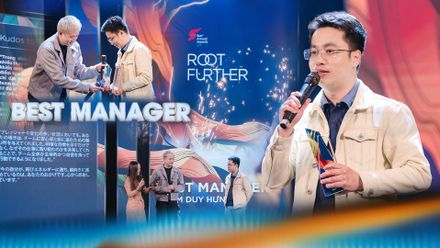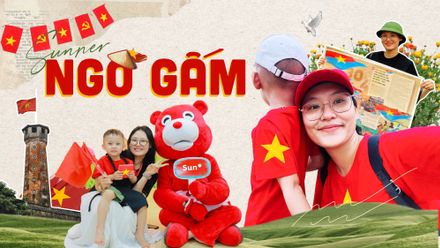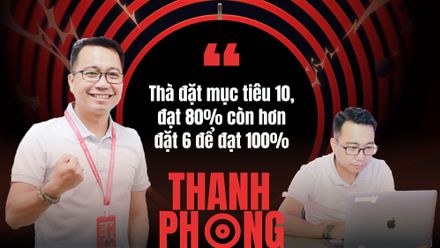Umeda Takuya “Even if I become wealthy, it is still meaningless if I do not benefit society."
At the end of last March, Mr. Takuya Umeda was officially appointed as the COO (Chief Operating Officer) of Sun*. Although many have already been impressed by his presentation about business results during the SAA 2023, there are still many intriguing things about this "big brother" that Sunners are eagerly awaiting to discover.
“Charismatic,” “impressive,” “Sun*’s Iron Man,”... these are all terms used by Mr. Taihei and others to describe Mr. Takuya Umeda. Having been with Sun* for nearly 7 years in various important roles, there still isn’t much information about him circulated among Sunners, which makes him always seem “mysterious,” arousing a lot of curiosity from members.
To help Sunners understand and get closer to this beloved man. Sun* News editorial team conducted an “exclusive” interview with Mr. Umeda to “unveil” these mysteries and decode from A to Z about our incredibly interesting “big brother.”
If everyone is ready, let’s begin!
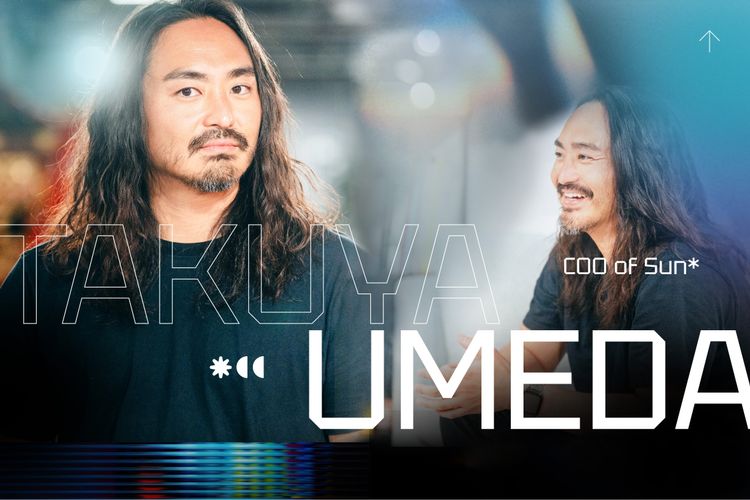
Good morning Mr. Umeda, thank you for joining us today.
Hello everyone, I’m Takuya Umeda, thank you for having me at this interview, I’m so delighted.
Sunners want to learn so much more about you. Could you share a bit about your journey before becoming an important part of Sun?*
Since we will be spending time together in the future, I think it will be helpful for everyone to understand the stories that have shaped who I am today. These are like currents that have influenced my character. To avoid being long-winded, I will try to be as concise as possible!
I come from a family with a lineage of entrepreneurs; many members of my family have founded well-known companies. However, my parents were typical Japanese civil servants, and I did not grow up in a wealthy household or receive any superior education. In 1990, when I was 10, my family moved to Kuala Lumpur, Malaysia, and I spent my teenage years there until graduating high school in Singapore at the age of 15.
Although I lived in Malaysia and Singapore, I attended a Japanese elementary school and could not speak English. At that time, school education did not interest me much, and I was quite a “problematic” student (Laughs). Spending my teenage years in Southeast Asia, I was immersed in the local culture, despite not actively participating in the Muslim or Chinese communities. Southeast Asia feels like a second home to me.
At 18, I returned to Japan with a passionate love for my homeland and studied diligently for a year for the university entrance exam. However, university life in Japan was rather bland for me. Thus, I worked part-time to save money for backpacking trips around the world with friends.
When you returned to Japan, did you have a clear direction for your future career, or what helped you choose your path?
Not initially, but during this time, I started reading Japanese history books recommended by my father. At the age of 20, I realized for the first time that I needed to become an investor or entrepreneur to create something important for the world. I also learned that this required a high level of knowledge and decided that I would never work just for money. With this mindset, I dropped out of university in Japan and got a visa to go to New York, wanting to learn from the world’s top economy. So at 21, while everyone else was job hunting, I embarked on a precarious and challenging journey.
By 27, I continued living a “nomadic” student life, gaining invaluable knowledge, making friends worldwide, acquiring skills like martial arts and cooking, and spending time with street artists. However, I still did odd jobs, like working in a basement restaurant in Brooklyn while delivering for Uber Eats.
This is a super short summary of my life before entering the business world.
What a fascinating life story! So now, shall we move on to the “chapter” of Sun?*
Not quite yet. Before joining Framgia (the predecessor of Sun*), I held various roles in a startup as CFO (Chief Financial Officer).
During my time at the startup, I went through many stages, from establishing the company to various startup phases: angel round, pre-seed round, seed round, and Series A. From this, I gained diverse experiences not limited to a specific role.
At that time, unlike most people, I lacked significant work experience. However, I was drawn to the startup industry because it offered many opportunities to create value, solve problems, and understand their impact on society. I was attracted by this value-creation process and believed it could become my lifelong pursuit.
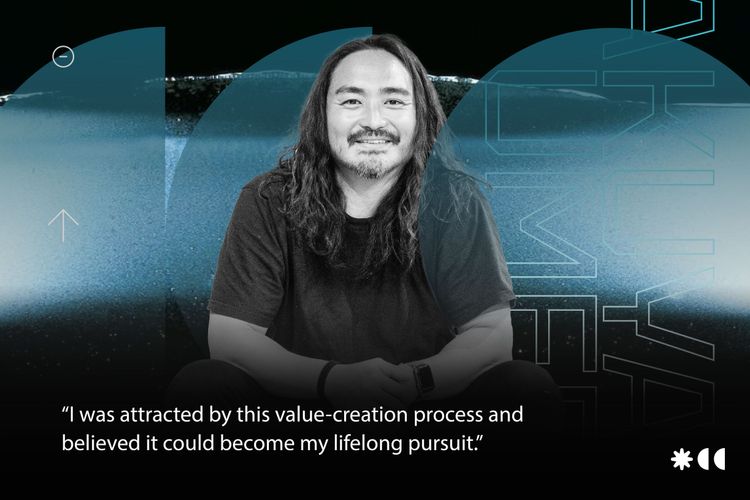
After leaving my previous company to seek new opportunities, I hadn’t met the members of Framgia. Therefore, I considered options like starting my own business or investing in a friend’s startup.
How did you proceed with those options?
Before I could act on them, I met Taihei, Hattori, and Hirai at the end of 2017 and was invited to the “Framgia Annual Awards” in Hanoi in the same year. That fateful meeting and my reflections on investing my time in the future led me to these conclusions:
- Among the myriad of problems to solve in the world, which ones are the most important? Time should be spent on fundamental and impactful issues.
- Even if I become wealthy, it is still meaningless if I do not benefit society or the world. Therefore, I think I should pursue endeavors that have a significant social impact.
- Instead of focusing on what to do, I think we should focus on finding the right people to work with. By overcoming challenges with comrades, we can achieve goals that are currently beyond our imagination.
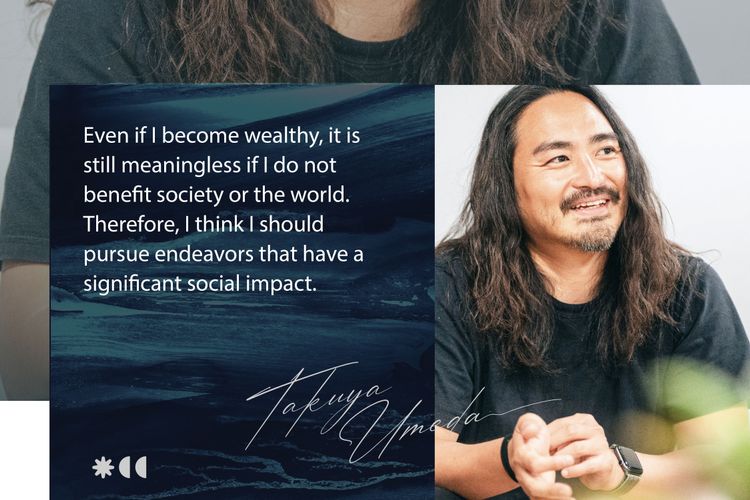
Essentially, the choices I make in life always focus on what is best for society, rather than simply considering if it’s something I can do.
Sun* posed an appealing challenge for me at that time, satisfying all three of these perspectives, so I joined the company without hesitation. Since then, I have experienced many things, but fundamentally, I believe I made the right choice, thus opening up many brand-new challenges.
As COO (Chief Operating Officer), what is your leadership philosophy? Does this differ from the company’s previous leadership direction?
In the previous question, I emphasized the importance of the people you work with. I believe Taihei and I became good friends from our first dinner together. Therefore, I think the basic culture and values of Sun* remain unchanged.
“Leadership Philosophy” may sound grand, but from my perspective, a leader needs:
- A positive and flexible mindset
- A strong curiosity and the valuable experiences and knowledge it brings
- Relentless effort to always reach the newest, most advanced peak of the world in every aspect
Listing everything might be too much, so I will stop here. From this perspective, I always ponder questions like:
- How can we maximize the growth speed of Sun*?
- How can we make our organizational and structural strengths the most advanced in the world?
- At what level should our company members be competent?
- What can the company provide for its members?
I believe that by steadily improving each of these issues, with the power and potential of a multinational company, Sun* can have a greater impact on society not only in Vietnam and Japan but globally.
Do you think being a “multinational company” is one of our strengths?
Of course. I always believe in the so-called “compound interest” when we have members from many different countries. If we can leverage this “compound interest,” we will certainly be more successful than a typical Japanese company. Look at the U.S. and think about why they are doing so well. Take Google as an example. Their outstanding success is mainly because their corporate culture transcends racial and national barriers. This gives them the diversity and strength of employees from various ethnic backgrounds. That is the “compound interest” I’m talking about.
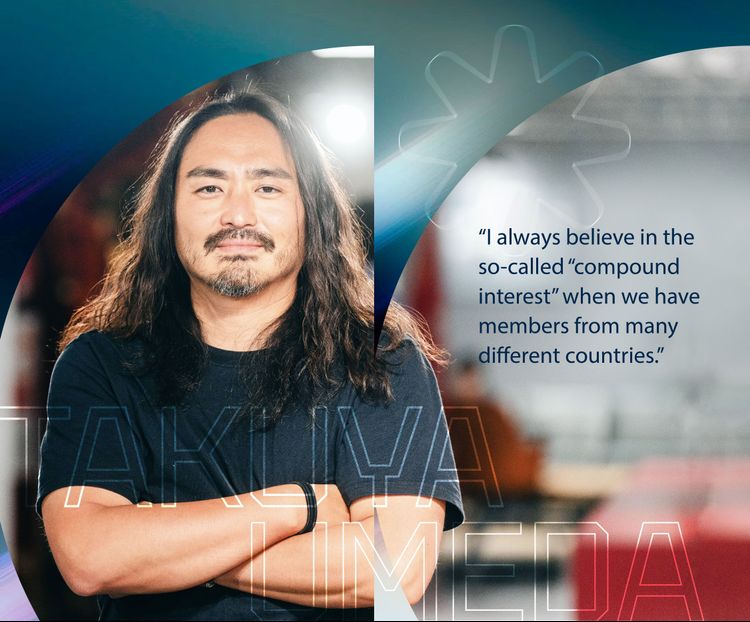
Ordinary Japanese companies have a purely Japanese culture, so they find it difficult to harness this diversity. Therefore, it’s fascinating that Sun* has always possessed cultural diversity from the very beginning, which is a potential we can long-term exploit.
Do you have any messages for Sunners on the upcoming journey?
I think the message can be divided into two main parts: a top-down view and a bottom-up view. Although both need to be implemented to achieve the ultimate goal, they may not seem related.
Firstly, from a top-down view: We believe we are at a critical point in history. Although this may sound cliché, I truly think so. In the flow of innovation from the Industrial Revolution to now, artificial intelligence (AI) is the most powerful. We believe that the gap between winners and others from this wave of innovation will create an insurmountable chasm between companies and individuals in the future.
To respond to the changes brought about by this wave of innovation, and in a situation where no one knows the right answer, Sun* wants to provide maximum support and encouragement to all members. However, we believe that Sun*'s value will only be realized when each individual can face challenges with independent thinking.
Secondly, from a bottom-up perspective: After experiencing rapid growth since its establishment, in recent years, Sun* has gradually transitioned into a mature phase, with recognized developments in both the Vietnam and Japan branches. This is the time for us to synchronize our strengths, aiming to create stronger relationships between the Vietnamese and Japanese teams through communication, collaboration, process coordination, and cultural integration, to grow together comprehensively, holistically, and sustainably.
One last question, which many Sunners are probably eager to know, is your work schedule in Japan and Vietnam in the coming time?
I will try to maintain a schedule of traveling to Vietnam once every two weeks, making the most of this time not only to address work but also to understand and connect more with everyone. The atmosphere at the Vietnam office always makes me feel loved and welcomed, so I will certainly do everything to reciprocate everyone’s affection.
I have a great fondness for Vietnam myself, so I want to experience more of your culture, landmarks, and cuisine.
Thank you very much, Mr. Umeda, for your sincere sharing. We wish you steadfastness in pursuing the values you believe in. See you in the next articles!
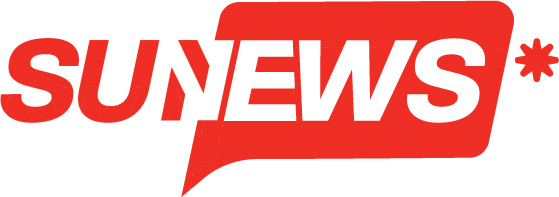
 VI
VI EN
EN